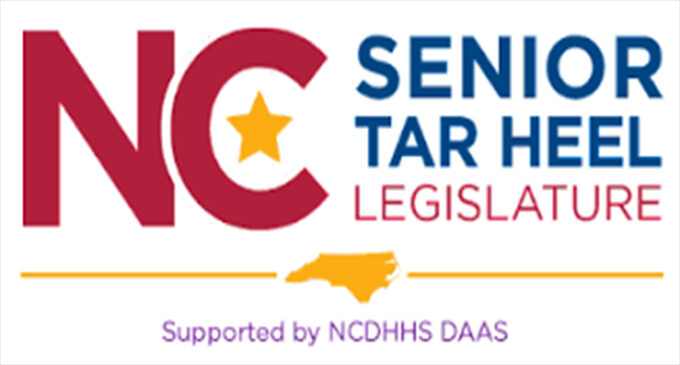NC Senior Tar Heel Legislature announces legislative recommendations for 2025-26

Dr. Althea Taylor Jones, North Carolina Senior Tar Heel Legislature (NCSTHL) delegate for Forsyth County, reports that the NCSTHL has approved legislative priorities for the 2025-26 lawmaking cycle starting in January 2025. These priority recommendations will be promoted to the N.C. General Assembly for sponsorship and enactment, to improve the well-being of older adults across the state. The announcement was made at a recent NCSTHL working session in Raleigh by Bill Lamb, chair of the Resolutions Standing Committee.
After months of study and deliberation, the NCSTHL members determined that these legislative priorities are among the most pressing issues facing our older adult population across the state. Speaker Woody Brinson shared, “Through enactment of legislation to address these needs, the North Carolina General Assembly (NCGA) would have the greatest positive impact on the quality of life and health outcomes for all our seniors.”
The priority recommendations are:
-
- Older Adult Housing. Alleviate the severe housing shortage by supporting the availability of safe, affordable, and accessible housing for older adults and help older adults age in place in their homes.
- Healthcare Workforce Crisis. Alleviate the critical shortage of healthcare workers by addressing the healthcare workforce crisis through expanded financial incentives and support for individuals pursuing careers in healthcare.
-
- Long Term Care Ombudsman Program. Strengthen the state’s Long-Term Care Ombudsman Program by addressing staffing concerns associated with paid ombudsman positions and defining roles and responsibilities of the county volunteer committees that monitor conditions in facilities.
- Nursing Home Staffing Standards. Strengthen nursing home staffing standards by adopting a state required minimum staffing standard at least equal to the current federal regulatory standard of 3.48 hours per resident per day.
- New Community-Based Services Program. Establish a funding stream of at least $2 million to be administered by the Division of Aging, outside of the constraints of the Home and Community Care Block Grant program, that supports services allowing recipients 60+ to live in their homes safely as long as possible.
- Senior Centers. Develop a plan to implement and fund a strong network of robust senior centers for all counties in the state, to ensure socialization and well-being, to provide information and education, to perform triage in providing appropriate assistance services, and to prevent debilitating isolation that impacts health and overall quality of life.
- Home & Community Care Block Grant. Create policies that rebalance the recurring system of in-home services versus institutional care, including budget appropriations to ensure continuity of home- and community-based annual services and supports (HCCBG) to address the rising number of older adults.
- Adult Protective Services. Pass statutory changes recommended by the Adult Protective Services Improvement Design Team and provide recurring state funding to support needed capacity to protect all vulnerable older and disabled adults across the state.
The NCSTHL recommends to the N.C. General Assembly these measures that stand to honor the lifelong contributions of the state’s older adults, to preserve their dignity, to ensure their continued productivity and well-being, and to safeguard their ability to age in the place of their choice, through strong policies and recurring funding streams. Dr. Althea Taylor Jones, delegate of Forsyth County, said, “Seasoned citizens (older adults) contribute untold millions to the state’s economy through volunteerism and activities that support the prosperity of younger generations, representing their adult children, grandchildren, great-grandchildren, and for many great-great grandchildren. Enacting these recommendations serves to avoid or postpone the far more costly option of long-term care placement, as well as to protect our most frail and vulnerable adults. State appropriations to support more fiscally-responsible in-home services are approximately 0.17% of the entire state budget, and the older adult segment of 24% of the state’s population deserves a more strategic, well-funded support network.”
For more information, contact Dr. Althea Taylor Jones at drataylorjones@gmail.com or 336-705-2501. Additionally, visit https://tinyurl.com/yc2zwnsv or contact Allison Brown, NCSTHL public relations chair, ncsthlpr@gmail.com or 336-940-8185.
Please visit the Piedmont Triad Regional Council of Government Area Agency on Aging for additional resources at this link: https://www.ptrc.org.









